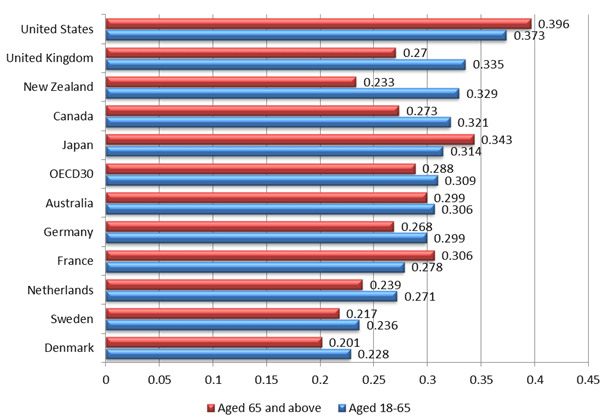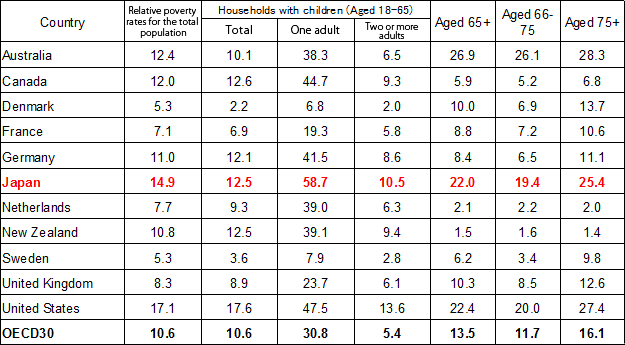While income inequality and poverty have been subject to extensive media coverage and debate, public awareness of the problems has not increased in a comparable fashion. Japan used to be called a "society of 100 million middle class people," a cliché referring to the phenomenon of the vast majority of the Japanese population identifying themselves as belonging to the middle class. Actually, this phenomenon is continuing today. The 2012 Public Opinion Survey on the Life of the People*1 conducted by the Cabinet Office found that 92.3% of the respondents considered themselves as belonging to the middle class in terms of living standards.
The Annual Health, Labour and Welfare Report 2011-2012*2 released in August 2012 introduces the outcome of the Public Opinion Survey on the Life of the People*3, conducted using a questionnaire that ensures comparability with other data for the International Social Survey Programme (ISSP)*4. While 71.5% of the respondents to the survey find the current level of income inequality in Japan to be too high, this percentage is among the lowest among advanced countries.
Does this mean that income inequality and poverty in Japan are not so serious?
Failure of income redistribution as evident from data
Needless to say, Japan is an advanced country. It is thus presumed that it has a well-developed social security system. Indeed, taxes are imposed in such a manner to facilitate the redistribution of wealth. That is, Japan has in place a mechanism designed to ensure a degree of fairness even if income inequality widens due to economic fluctuations or changes in the demographic structure. In reality, however, it is highly suspected that this mechanism may not be functioning properly.
An international comparison of income inequality, measured by the Gini coefficient (in which 0 corresponds to perfect equality and 1 to perfect inequality) based on data provided by the Organisation for Economic Co-operation and Development (OECD), shows that Japan exceeds the average for the OECD countries in the level of income inequality for those aged above 65 as well as for those aged 18-65 (see Figure 1). Furthermore, the degree of income inequality for the former age group is greater than that for the latter, contrary to the general tendency for income inequality to decrease in old age as a result of retirement and thanks to pension and other income security benefits.
Then, how does Japan compare in the poverty rate, an indicator related to inequality (see Figure 2)? According to the aforementioned international comparison made by the OECD, Japan's relative poverty rate—the percentage of people with income equal to or below 50% of the median income—is one of the highest among advanced economies. In particular, in the relative poverty rate for single-parent households, Japan ranks the worst among advanced economies at 58.7%, 10 percentage points higher than that of the United States, the second worst. It is obvious that Japan's social security policy is failing as an income redistribution mechanism.


Efficient social security system needed
A natural policy response to such circumstances is to increase social security benefits and strengthen the redistributive function of taxes. This, however, is not an easy policy option for Japan, a country with general government debt amounting to more than 1,024 trillion yen. Furthermore, as we all know, this is a country where the legislative branch of the government had to struggle so hard to secure a future increase in the consumption tax rate. Given all of these odds, the aforesaid policy option is impossible. But then, what other option is left for Japan? The answer to this question is nothing extraordinary other than finding an efficient combination of social security benefits and taxes.
Building an efficient social security system involves the following two prerequisites. First, it is necessary to define precisely the primary beneficiaries of social security benefits and wealth redistribution. Second, it is necessary to bring out self-help efforts as much as reasonably possible and strike a fair balance with public support. Without fulfilling these prerequisites, no constructive discussion can be made on the designing of a social security system.
In order to achieve that end, it is crucial to conduct comprehensive statistical surveys of Japanese households and individuals on a continuous basis. In particular, such surveys must be conducted as panel surveys to allow a longitudinal observation of the same sample of households or individuals, with questionnaires designed to investigate all aspects of people's lives, including not only economic conditions such as income and assets but also individuals' bonds with their families and society at large as well as health conditions. Surveying various aspects of people's lives will enable us to identify the attributes of households in poverty. Being a single-mother household or an elderly-only one does not automatically make it impoverished. It may be the case that the addition of another specific factor—disease, unemployment, poor education, or family problems—serves as a decisive blow that definitely pushes such households into poverty. By analyzing various factors holistically, we can obtain information necessary to determine the quality and quantity of support needed.
It is also important to carry out surveys on a continuous basis. For instance, even if an individual's health condition does not cause the individual to leave or quit a job at one point of time, diachronic changes in the health condition subsequent may do so at a later point of time. Also, even among those who have just started receiving equally low amounts of pension benefits, some would seek to re-enter the labor market while others would choose to live on welfare. Such differences in choices may be attributable to changes in their respective health conditions and cognitive abilities. In order to bring out self-help efforts reasonably, the influence of all of these factors must be taken into account.
JSTAR and its utilization
This article is intended to highlight the importance of accurate statistical surveys to enable the government to formulate policy firmly based on the actual status of inequality and poverty. However, what has been discussed to this point is nothing new. Since the time of Charles Booth (1840-1916) and Benjamin Seebohm Rowntree (1871-1954), British sociologists who pioneered modern poverty research, seeking to understand scientifically and quantitatively the kinds of people suffering from poverty and the support needed has always been the orthodox way of poverty research. What we need to do is to pursue this endeavor by mobilizing the currently available resources and at an academically rigorous level by today's standards.
Conducting such a longitudinal follow-up survey (or panel data survey) of households requires the input of enormous financial and human resources. In the United States, efforts were launched in the 1990s and various kinds of panel data—collected and accumulated over the years by utilizing rich research resources—have contributed significantly to the government's policymaking. In Japan, similar efforts are being undertaken by such institutions as the Institute of Research on Household Economics, Keio University, and Osaka University. At the Research Institute of Economy, Trade and Industry (RIETI), we are conducting the Japanese Study of Aging and Retirement (JSTAR), a panel data survey of middle-aged and elderly people in Japan, in collaboration with Hitotsubashi University and the University of Tokyo. Furthermore, the micro-data collected in the JSTAR survey are being made available, after appropriate masking is done to ensure the confidentiality of personally identifiable information, to researchers all around the world for use in academic research. Currently, data collected in the first and second waves of the JSTAR survey are available, and many Japanese and overseas researchers, including myself, are conducting research utilizing them. I have just recently published the findings of my JSTAR data-based research on the relationship between poverty and labor supply (Nakata, 2012). It is hoped that many more research findings will be accumulated to contribute to the formation of tax and social security policies in Japan.


